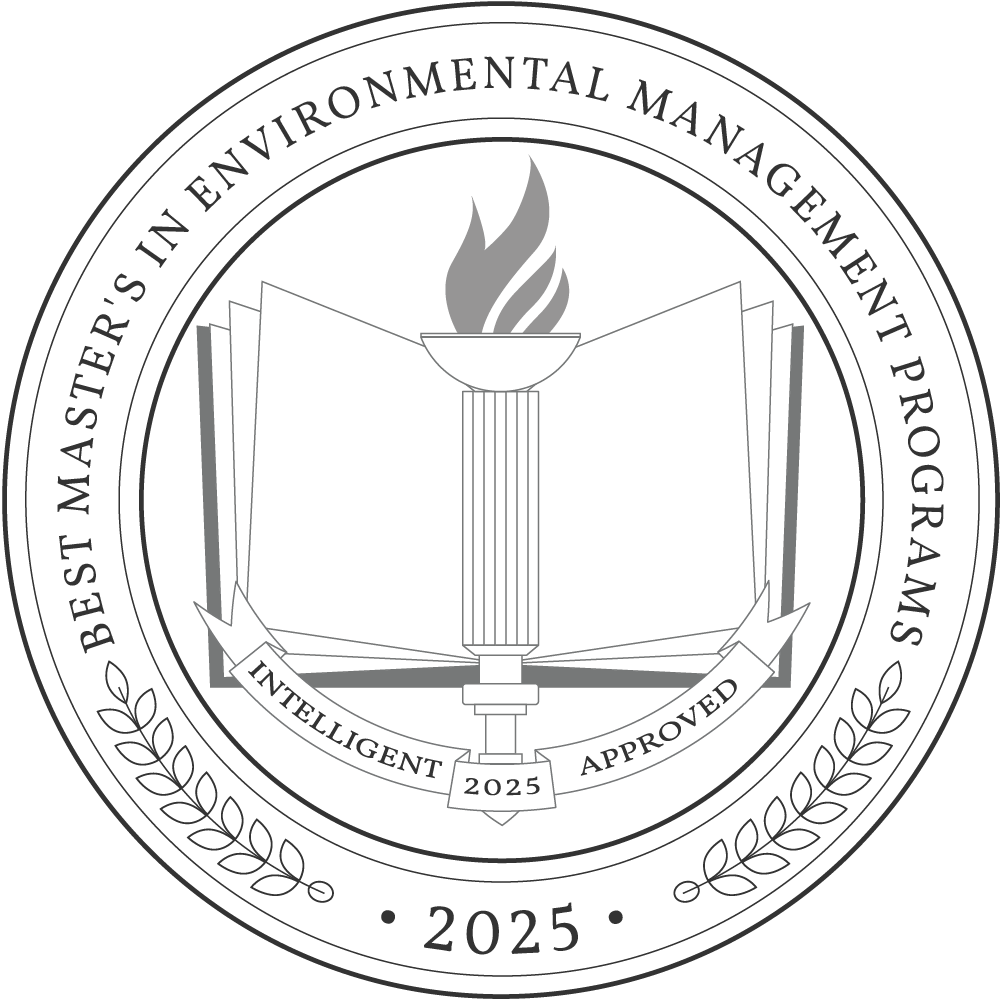A master’s degree in environmental management is the next step for students looking for advanced challenges and opportunities in environmental science and sustainability. With growing awareness and concern for how human activities impact the environment, jobs for environmental management specialists are on trend to create 6,900 job openings each year from 2022 to 2023.
Graduates can pursue various research, management, consulting, and other in-demand roles in many industries. Environmental engineers earn an annual median wage of $96,530, and environmental scientists earn approximately $76,480. Students can develop the expertise required for these roles with a master’s in environmental management, which costs approximately $20,513 annually. Programs usually span about two years and offer many work co-op and internship opportunities to immerse students in the environmental management and science field.
Why Trust Us
The Intelligent.com Higher Education Team is dedicated to providing students with independent, equitable school and program rankings and well-researched resources. Our expert-driven articles cover topics related to online colleges and programs, paying for school, and career outlooks. We use data from the U.S. Department of Education’s College Scorecard, the National Center for Education Statistics, and other reputable educational and professional organizations. Our academic advisory team reviews content and verifies accuracy throughout the year for the most current information. Partnerships do not influence rankings or editorial decisions.
- Analyzed over 2,000 national, accredited, and nonprofit colleges and universities
- 800+ rankings pages are reviewed and updated yearly
- Content is informed by reputable sources, surveys, and interviews with academic advisors and other experts
- Over 100 data points are reviewed for accuracy and quality throughout the year, including sources
How we rank schools
Our list features the best Master’s in Environmental Management degree programs at top colleges nationwide. Each school featured is a nonprofit, accredited institution — either public or private — with a high standard of academic quality for post-secondary institutions.
We evaluated each school’s program on tuition costs, admission, retention and graduation rates, faculty, reputation, and the student resources provided for online students. We collected data from trusted sources like the National Center for Education Statistics, individual school and program websites, school admissions counselors, and other data sources. Then, we calculated the Intelligent Score on a scale of 0 to 100 based on the following criterion:
Academic Quality:
- Admission rate versus enrollment rate
- Retention rate of students who return after year one
- Accreditation status (regional and programmatic)
- Nonprofit status, both private and public institutions
Graduation Rate
- Overall graduation rate
- Total number of currently enrolled students, including diversity metrics
- Student-to-faculty ratio
Cost and ROI
- In-state and out-of-state per-credit tuition rates and fees
- Required credits to graduate
- Earning potential after graduation
- Availability of federal student loans, scholarships, and other financial aid options
Student Resources
- Available student services for online-only and hybrid programs
- On-campus amenities like tutoring centers and the number of libraries
Read more about our ranking methodology.
Best 13 Accredited Environmental Management Programs
FiltersInstitution Type
Status
- Intelligent Score
- Alphabetically By University Name
- Acceptance Rate
- Enrollment
- In-state Graduate Tuition
- Out-of-state Graduate Tuition
- In-state Undergraduate Tuition
- Out-of-state Undergraduate Tuition

University of Montana
Intelligent Score: 99.35In-state: $5,352
Out-of-state: $25,106
In-state: $5,076
Out-of-state: $5,076
SAT: 1050-1240
ACT: 20-27
In-State: $836
Out-of-State: $3,132
On-Campus
Northwest Commission on Colleges and Universities
33-36

University of Colorado Denver
Intelligent Score: 98.59In-state: $10,728
Out-of-state: $34,930
In-state: $11,826
Out-of-state: $11,826
SAT: 1130-1350
ACT: 25-31
Resident: $450
Non-Resident: $1,400
On-Campus
Higher Learning Commission
36

Portland State University
Intelligent Score: 97.51In-state: $7,907
Out-of-state: $25,536
In-state: $14,652
Out-of-state: $14,652
SAT: 1000-1190
ACT: 17-24
Resident: $485
Non-Resident: $715
On-Campus
Northwest Commission on Colleges and Universities
45

Indiana University Bloomington
Intelligent Score: 96.9In-state: $9,815
Out-of-state: $36,194
In-state: $9,786
Out-of-state: $9,786
SAT: 1120-1350
ACT: 24-31
Resident: $547
Non-Resident: $1,372
On-Campus
Higher Learning Commission
36

Georgia Institute of Technology
Intelligent Score: 96.76In-state: $28,106
Out-of-state: $49,218
In-state: $27,898
Out-of-state: $27,898
SAT: 1370-1530
ACT: 31-35
Resident: $586
Non-Resident: $1,215
On-Campus
Southern Association of Colleges and Schools Commission on Colleges
30

Arizona State University
Intelligent Score: 96.29In-state: $10,710
Out-of-state: $28,800
In-state: $11,720
Out-of-state: $11,720
SAT: 1100-1320
ACT: 21-28
Resident: $897
Non-Resident: $1,472
On-Campus, Online
Higher Learning Commission
30

Yale University
Intelligent Score: 96.19In-state: $57,700
Out-of-state: $57,700
In-state: $44,500
Out-of-state: $44,500
SAT: 1460-1580
ACT: 33-35
$2,135
On-Campus
New England Association of Schools and Colleges
48

University of California, Davis
Intelligent Score: 95.81In-state: $38,556
Out-of-state: $68,628
In-state: $45,544
Out-of-state: $45,544
SAT: 1150-1410
ACT: 24 - 31
Resident: $607
Non-Resident: $1,326
On-Campus
Western Association of Schools and Colleges Senior College and University Commission
42

University of Pennsylvania
Intelligent Score: 94.24In-state: $53,166
Out-of-state: $53,166
In-state: $37,678
Out-of-state: $37,678
SAT: 1460-1570
ACT: 33-35
$2,230
On-Campus
Middle States Commission on Higher Education
36

Georgetown University
Intelligent Score: 92.68In-state: $57,384
Out-of-state: $57,384
In-state: $53,136
Out-of-state: $53,136
SAT: 1380-1550
ACT: 31-35
$2,550
On-Campus
Middle States Commission on Higher Education
30

Oklahoma State University
Intelligent Score: 92.32In-state: $5,357
Out-of-state: $20,877
In-state: $5,531
Out-of-state: $5,531
SAT: 1020-1250
ACT: 21-28
In-State: $471
Out-of-State: $1,118
On-Campus
Higher Learning Commission
33

Duke University
Intelligent Score: 91.10In-state: $55,880
Out-of-state: $55,880
In-state: $57,900
Out-of-state: $57,900
SAT: 1470-1570
ACT: 34-35
$1,926
On-Campus
Southern Association of Colleges and Schools Commission on Colleges
48

Cal Poly Humboldt
Intelligent Score: 88.92In-state: $24,856
Out-of-state: $36,736
In-state: $29,408
Out-of-state: $29,408
SAT: 1040-1273
ACT: 21-24
$651
On-Campus
Western Association of Schools and Colleges Senior College and University Commission
30
How to Choose an Environmental Management Program
Choose your area of study
Environmental science is a broad field with many specializations and career opportunities, and environmental management graduate programs prepare students for a variety of advanced leadership and research roles. As you research areas of study, consider your career objectives, personal interests, and other factors to find a program that aligns with your goals.
Most master’s of environmental management programs fall under a science designation and utilize science-based strategies to develop students’ understanding of sustainability, risks, financial concepts, and regulations. These programs best suit those interested in leadership roles that use analysis skills to address environmental challenges, such as environmental engineering, urban planning, and consulting.
Environmental science graduate degrees overlap concepts with management programs but focus on climate and environmental research and analysis. These programs emphasize math and science and help students develop the skills to gather and analyze data to identify and study environmental issues. Graduates often pursue careers as climate scientists, environmental scientists, and other research or educational faculty positions.
Since environmental science is a broad field, most master’s programs require students to specialize. Programs vary, but common specialization options include:
- Energy and environmental systems
- Freshwater and terrestrial ecology
- Coastal and marine systems
- Environmental economics and policy
- Ecotoxicology
Research schools and programs
Start your research on school and program websites, where you’ll find an overview of what to expect during your education. Speak to admissions counselors or program representatives for additional insight, and attend in-person or virtual campus tours, open houses, and information sessions.
Throughout your research, verify that schools and programs have institutional regional accreditation by referencing the Council for Higher Education Accreditation and the Database of Accredited Postsecondary Institutions and Programs. Accrediting bodies evaluate schools according to the Department of Education’s quality standards, and accreditation is necessary for federal financial aid eligibility. Accreditation can also affect your ability to transfer credits or even gain employment.
Prepare for tests and applications
Admission requirements vary by institution and program, but they typically include the following:
- Application form and fees
- Bachelor’s degree in a related field
- Transcripts and minimum GPA
- Letter(s) of recommendation
- Personal essay or statement of purpose
- Resume or CV
- GRE or GMAT scores
- TOEFL scores (for students educated in a non-English language)
Applicants for environmental management programs typically possess an undergraduate degree in physical or chemical sciences such as geography, geology, biology, chemistry, or engineering. Some programs have minimum calculus and statistics credit requirements, and they may require previous training, work experience, or additional education related to your area of study.
Select your program
Programs and institutions offer various features and logistics that can shape students’ overall experience and success. Consider the following:
- Curriculum
- Tuition cost
- Course delivery method
- Graduation requirements
- Practical experience
- Recreation and amenities
Some factors may carry different weight in program selection depending on individual circumstances. For instance, those already in the workforce or with other obligations may prefer the flexibility and convenience of an online, part-time, or hybrid program; others may find they work best in structured in-person programs.
Determine how you’ll pay for your degree
Most students pay for their education with a combination of savings, loans, grants, scholarships, and other funding. Regardless of financial circumstances, students should complete the Free Application for Federal Student Aid (FAFSA) form, which assesses and awards students with need-based financial assistance.
Merit-based aid from your institution, non-profit foundations, and various private organizations can help fund your degree. Some environmental management programs may also offer fellowship or assistantship positions with stipends, tuitions, or salaries. If you’re employed, inquire with your employer about tuition assistance benefits.
What Can You Expect From an Environmental Management Program?
Master’s of environmental management degree programs provide students with the theoretical understanding, practical skills, and experience necessary for environmental careers. Students develop expertise in topics of their choice and build on concepts such as resource management, climate law and regulations, and environmental technology. They also learn how these concepts intersect with business fundamentals and social sciences.
Curriculums and graduation requirements vary. Most require a blend of core and elective courses and seminars and may require internships, practicums, or work co-ops. Programs often have either thesis or capstone project tracts. Depending on graduation requirements, environmental management master’s programs can take one to five years.
Potential courses you’ll take in an environmental management program
- Natural Resource Management: Students study environmental and natural resource issues and focus on the theory and methods of environmental problem analysis. Topics may include non-market valuation, benefit-cost analysis, and non-renewable resource extraction.
- Environmental Law and Policy: This course examines how government, economic, and social forces develop and implement environmental laws and policies. Students gain skills to assess policy changes and their impacts on organizations.
- Energy and Environment: Students develop a deep understanding of energy systems in the context of social, economic, and political influencers. They also study the challenges of energy reliance, such as energy resources, increased demand, and environmental degradation.
- Sustainable Business Strategy: This course explores how sustainability intersects with corporate management and strategy. Students learn to incorporate environmental, safety, and health considerations into decision-making for business risk and policy formulation.
Environmental Management Degree Frequently Asked Questions
How do I apply to an environmental management degree program?
Schools and programs typically list admissions requirements on their website, and most guide prospective students through the digital application process with an admissions portal. Applications generally require transcripts, a personal statement, an essay, and test scores.
Program pages may list specific requirements, such as educational background, but an admissions counselor can verify required information and eligibility, confirm deadline dates, and answer additional questions. They can also provide insight and recommendations for your application and study goals.
How much does an environmental management degree cost?
The yearly tuition average for master’s programs is $20,513. That doesn’t account for materials, books, housing, and other living expenses. Tuition also varies depending on whether the institution is public or private and whether you’re an in-state or out-of-state student.
These figures don’t necessarily reflect your upfront cost — scholarships, grants, loans, and other financial aid assistance can reduce out-of-pocket expenses.
How long does it take to earn an environmental management degree?
Various factors affect the pace and duration of an environmental management master’s degree program, ranging from one to five years. Most programs require about 30 credits to satisfy graduation requirements in addition to thesis and capstone projects. Additional semesters of internships and work co-ops can also extend degree length.

